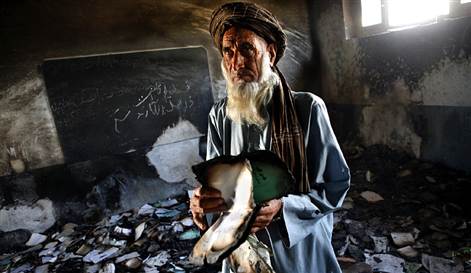A War on Schoolgirls
Unable to win on the battlefield, the Taliban are fighting to prevent half the country's children from getting an education.
 Zalmai for Newsweek
Up in Flames: Taliban torched this school to stop girls from learning
Zalmai for Newsweek
Up in Flames: Taliban torched this school to stop girls from learning
By Ron Moreau and Sami Yousafzai
Newsweek
June 26, 2006 issue - Summer vacation has only begun, but as far as 12-year-old Nooria is concerned, the best thing is knowing she has a school to go back to in the fall. She couldn't be sure the place would stay open four months ago, after the Taliban tried to burn it down.
Late one February night, more than a dozen masked gunmen burst into the 10-room girls' school in Nooria's village, Mandrawar, about 100 miles east of Kabul. They tied up and beat the night watchman, soaked the principal's office and the library with gasoline, set it on fire and escaped into the darkness. The townspeople, who doused the blaze before it could spread, later found written messages from the gunmen promising to cut off the nose and ears of any teacher or student who dared to return.
The threats didn't work. Within days, most of the school's 650 pupils were back to their studies. Classes were held under a grove of trees in the courtyard for several weeks, despite the winter chill, until repairs inside the one-story structure were complete. Nearby schools replaced at least some of the library's books. But the hate mail kept coming, with threats to shave the teachers' heads as well as mutilate their faces. Earlier this month, NEWSWEEK visited and talked to students and faculty on the last day of classes. Nooria, who dreams of becoming a teacher herself, expressed her determination to finish school. "I'm not afraid of getting my nose and ears cut off," she said, all dressed up in a long purple dress and headscarf. "I want to keep studying."
Schoolgirls need that kind of courage in Afghanistan. Unable to win on the battlefield, the Taliban are trying to discredit the Kabul government by blocking its efforts to raise Afghanistan out of its long dark age.
They particularly want to undo one of the biggest changes of the past four years: the resumption of education for girls, which the Taliban outlawed soon after taking power in 1996. "The extremists want to show the people that the government and the international community cannot keep their promises," says Ahmad Nader Nadery of the Afghanistan Independent Human Rights Commission (AIHRC). Today the Ministry of Education says the country has 1,350 girls' schools, along with 2,900 other institutions that hold split sessions, with girls-only classes in the afternoon. (Coeducation is still forbidden.) More than a third of Afghanistan's 5 million schoolchildren are now girls, compared with practically none in early 1992. In the last six months, however, Taliban attacks and threats of attacks have disrupted or shut down more than
300 of those schools.
Most of the closures have been in the far south, where the Taliban are strongest, but schools are also getting hit in areas that used to be relatively safe, like the fertile river valleys of Laghman province. The rock-walled compound where Nooria attends classes is one of six schools for girls in the province that have been torched so far this year. The damage at two of them was so bad that they remain closed. In nearby Logar province, arsonists have struck 10 sister schools—all within 50 miles of Kabul. "People are extremely frightened," says Palwasha Shaheed Kakar, the AIHRC representative in neighboring Nangarhar province, where at least eight other schools have burned. "These extremists need to attack only one or two schools to send a strong message."
The girls' school in Haider Khani village, just up the main road from Mandrawar, has suffered a sharp drop in attendance since January, when masked gunmen forced their way in and torched the place. Before the attack, up to 80 percent of the families in Haider Khani were sending their daughters to school, according to the principal, Fazal Rabi. An American military Provincial Reconstruction Team quickly repaired the damage and reopened the school. Even so, the principal reckons that only 40 percent of the village's preteen girls came back, and only 10 percent of the teenagers. Parents dread what might happen on the walk to school. Teachers get scared, too. Since the Mandrawar attack, Nooria's teacher, Farida, has traveled to and from school every day wearing a burqa and escorted by a male relative.
"Otherwise I fear my nose and hair will be cut off," she told NEWSWEEK.
http://www.msnbc.msn.com/id/13392086/site/newsweek/

